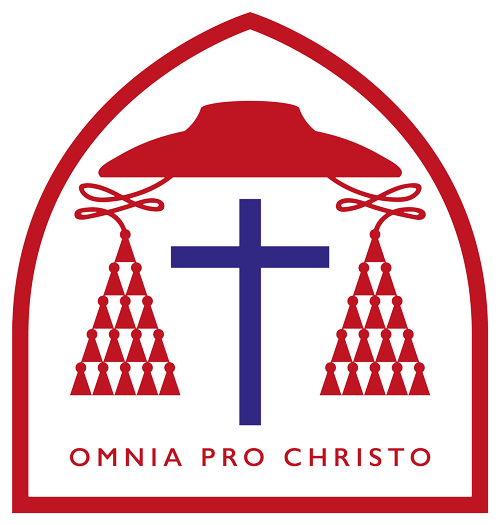Careers Education, Information, Advice and Guidance (CEIAG) at Cardinal Wiseman Catholic School
Pupils have to stay in education, employment and / or training until they are 18. At Cardinal Wiseman Catholic School we teach the pupils that they must be intentional and prophetic for their futures: they need to proactively plan for their lives beyond school, making the most of all the opportunities they are given. In our current school community we have the doctors, nurses, engineers, architects and teachers of the future, and we have an important responsibility to carefully guide the pupils so that they fulfil their God-given potential and are set on the right pathway post-16.
The phrase ‘Ad Astra’ - ‘To the Stars’ - underpins our careers programme as we seek to inspire the pupils to pursue their future careers with total commitment and passion, always aiming high and becoming the people God intended them to become.
“Cardinal Wiseman set me up for my future, it provided me with the knowledge I needed whilst helping to nurture my skill set, preparing me for life after school”. Tayla Judge, Cardinal Wiseman Catholic School Alumnus
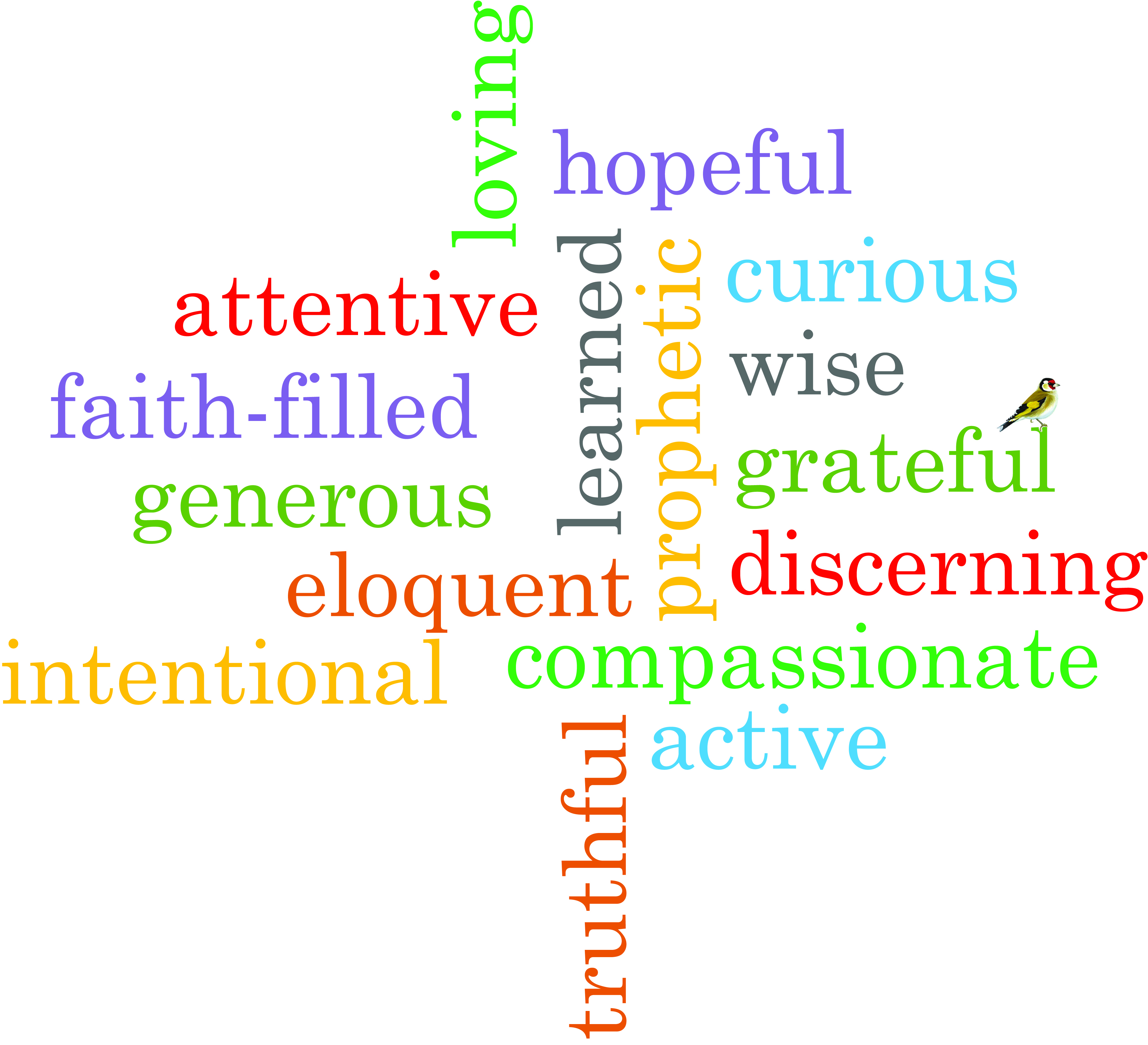
A Comprehensive Careers Programme
Our careers programme enables all of our pupils, from Year 7 to 11, to make informed choices at every stage of their Cardinal Wiseman journey. We provide impartial advice and guidance, challenge stereotypes - especially with regards to girls working in the STEM industries, and keep the pupils abreast of current Labour Market Information (LMI) in this ever-changing world.
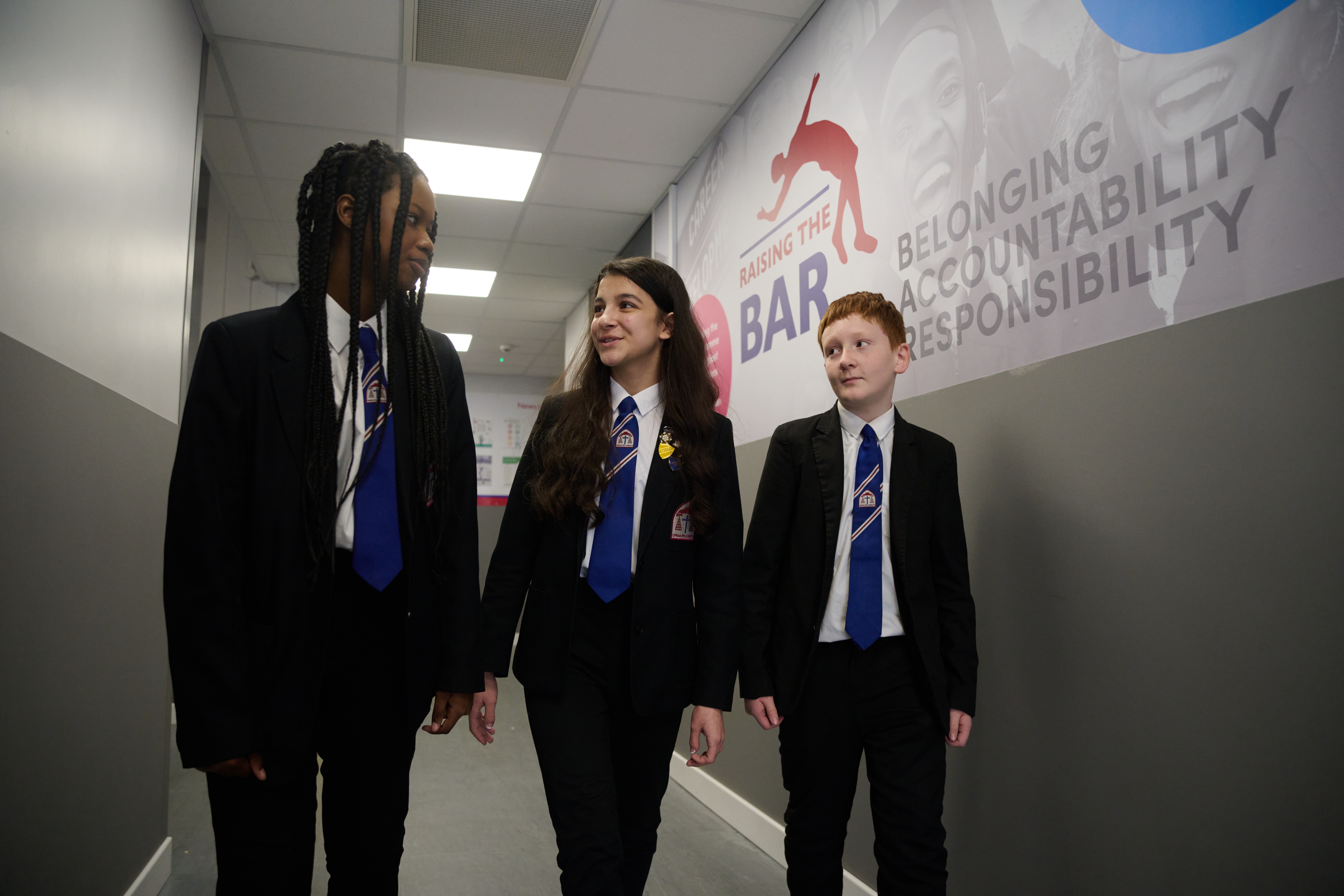
We have strong links with local post-16 institutions, apprenticeship providers, employers and our alumni so that the pupils hear from a whole host of different voices. We also work with a number of prestigious Universities, with trips to Oxford and Birmingham. Effective careers education is a key priority for the school; it is an important part of the PSHE curriculum, and promoted via the different subject areas. At every stage we aim to broaden the pupils’ horizons and set them up for a wonderful, fulfilling life when they leave us. It is testament to everything that we do at Cardinal Wiseman that we have so many of our alumni working with us to inspire the next generation.
“There are careers fairs, mentoring sessions and lessons which provide information about various career paths. We also have guest speakers from different professions who share their experiences”. Pupil feedback.
Careers related workshops, talks, trips and events are a regular part of the school calendar, with one of the highlights being the annual careers ‘speed dating’ extravaganza we hold in the Autumn term, where 30-plus employees, employers, alumni and post-16 providers visit the school to engage with the pupils and inspire them for their futures. Our latest event included people from South and City College, BMET, Hilton Birmingham Metropole, Vinci Construction, Zurich Insurance, BMW and West Midlands Fire Service to name just a few.
“I just wanted to say thank you for having us today at your fabulous event. It's great to see the students getting an insight into the working world at an early age. The students were all very polite and engaging, even though we know it can be daunting talking to adults they don’t know. We had some great questions, which shows they were really interested in finding out about our jobs. We would love to attend again in the future”. Stakeholder Feedback
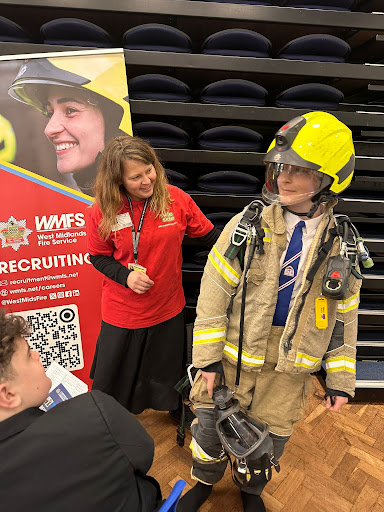
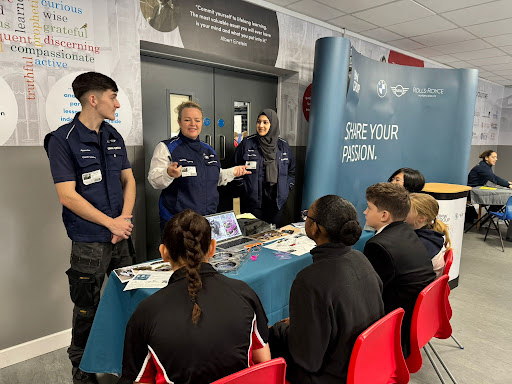
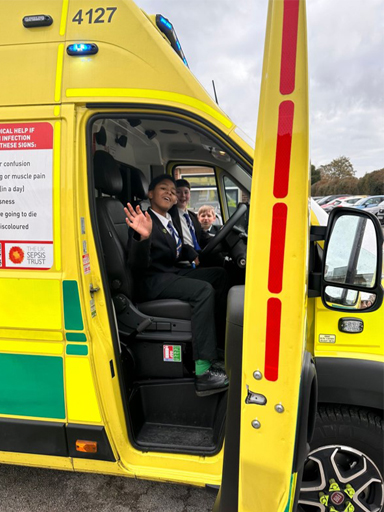
Up-to-date Labour Market Information (LMI) is regularly shared, and vocational and technical post-16 routes are actively promoted alongside the more traditional routes, so that the pupils are able to make informed decisions. In January 2023, the updated Provider Access Legislation (PAL) came into force. The updated legislation states that schools must provide at least 4 encounters with approved providers of apprenticeships and technical education for all pupils by the end of year 11. At Cardinal Wiseman we are committed to our obligation to meet the requirements of the PAL.
Every pupil in Year 10 and 11 has a one-to-one interview with a qualified, impartial Careers Advisor; with SEND and more vulnerable pupils receiving lots of additional careers input. All students in year 10 have the opportunity to go on work experience placements where they will experience the world of work and gain invaluable employability skills.
Unifrog is the platform we use to promote careers with the pupils, parents and staff at every opportunity. It is also how we monitor pupil engagement with our careers programme.
If you have any questions or would like to raise anything around our CEIAG provision please contact Mrs Buckle, the Assistant Headteacher with responsibility for careers [email protected] Alternatively, you can contact our Careers Advisor on [email protected] if you would like to ask him a specific question.
The Gatsby Benchmarks:
There are 8 Gatsby Benchmarks which schools are assessed on for their careers provision (see below). Cardinal Wiseman is well above national averages in all 8 areas. Our careers programme is revised annually to ensure it remains on target, and meets the varying needs of our pupil population. For more information on the Gatsby Benchmarks follow the link: Education | Gatsby
- A stable careers programme
- Learning from career and labour market information
- Addressing the needs of each pupil
- Linking curriculum learning to careers
- Encounters with employers and employees
- Experiences of workplaces
- Encounters with further and higher education
- Personal guidance
Helping you understand CEAIG:
Requirements:
All young people in England must continue in education or training until 18 years of age. This does not necessarily mean staying in school; young people have a choice about how they continue in education or training, which could be through:
- Full-time study in a school, college or with a training provider.
- Full-time work or volunteering combined with part-time education or training.
- An apprenticeship.
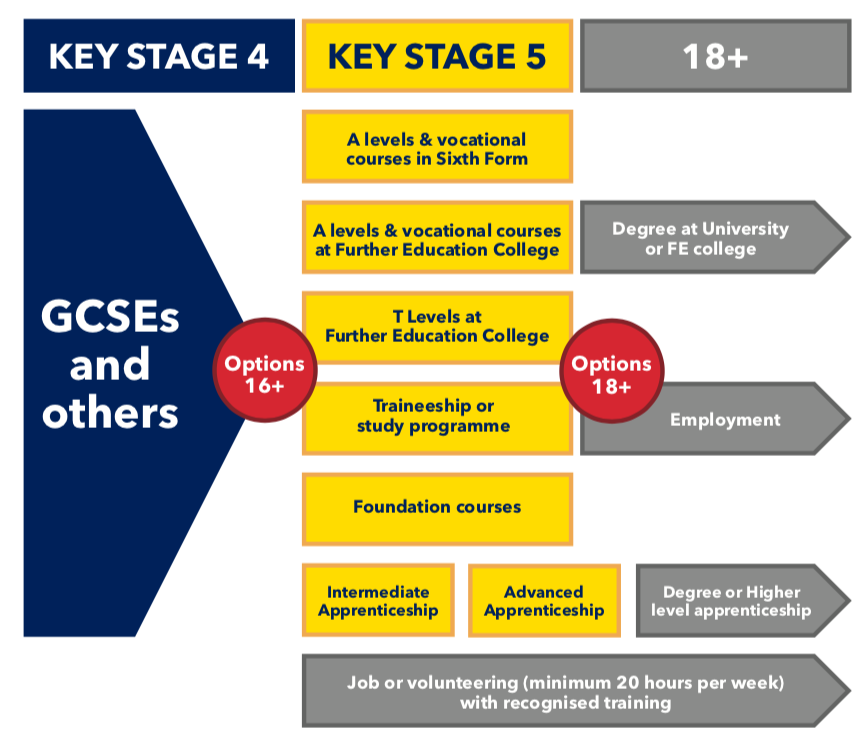
For more information on any of the above, I would encourage you to explore the useful websites below:
- Resources - Amazing Apprenticeships
- Parent Guide - Apprenticeships
- Further and higher education, skills and vocational training You can use this website to search for live apprenticeships.
- https://ladderforbirmingham.co.uk/ You can use this website to search for live apprenticeship opportunities in the Birmingham area.

Understanding the terminology:
- Labour Market Information (LMI) - LMI is a useful tool to help research future jobs in the local area, understand the skills needed for certain roles and the demand for future employment. The latest edition of ‘Careersmag’ has useful information on newly emerging careers, and is a good starting point for sparking a conversation around LMI: Careermag for Parents | Careermap We teach the pupils to keep abreast of this information so that they can plan for their futures in this ever changing world. See below for recent LMI for the Greater Birmingham and Solihull region.
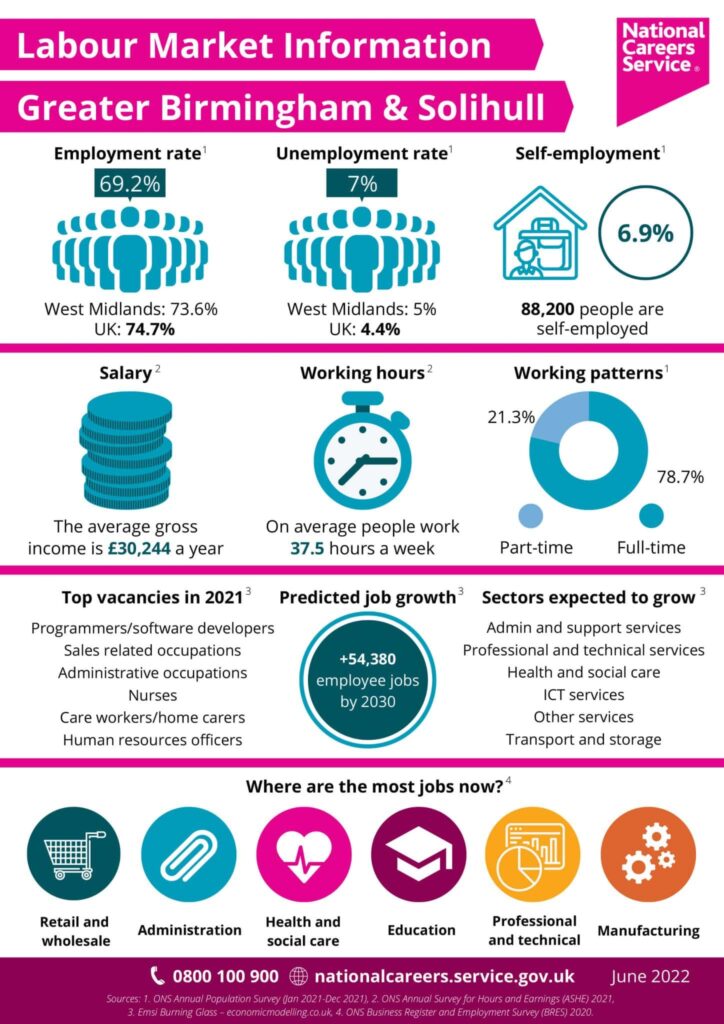
- Apprenticeships: An apprenticeship is a paid job where the employee learns and gains valuable experiences. Alongside on-the-job training, apprentices spend at least 20% of their working hours completing classroom-based learning with a college, university or training provider which leads to a nationally recognised qualification. An apprenticeship is a great paid work opportunity for people over the age of 16. Different apprenticeship levels equate to different qualification levels.
- Level 2 (intermediate) GCSE equivalent
- Level 3 (Advanced) A Level equivalent
- Level 4,5,6 & 7 (Higher) Foundation Degree and above equivalent
- Level 6 & 7 (Degree) Bachelors or Master’s Degree equivalent
- Traineeships: Traineeships are a great option for young people who are not yet ready for an apprenticeship because they provide opportunities to gain the relevant skills and experience to take on an apprenticeship and prepare for work.
- T-Levels - T-Levels are a relatively new, 2-year qualification. The Government developed T-Levels to deliver world class technical education and give pupils a new choice after GCSEs. T-Levels have been designed in partnership with businesses and employers to give pupils the knowledge and skills they need – so they can be confident that a T-Level will help them move into the career they want. For more information, visit this page: https://www.tlevels.gov.uk/
- A-Levels (Advanced Level qualifications) - A-Levels are a subject-based qualification for pupils aged 16 and above. They are usually studied over two years, leading to qualifications recognised for entrance to higher education institutes. Most higher education institutes require a minimum of 3 subjects.
- Further Education (FE): Further Education is the term given to any education after secondary school that is not an undergraduate or postgraduate degree. It’s what you learn after the age of 16, but usually not at university.
- Higher Education: Higher Education is the term used when we’re talking about education at university. You usually have to be 18 or over to take a higher education course.
Useful Websites / Links:
- Birmingham Careers Service: Birmingham Careers Service is a free and friendly support service providing careers information, advice and guidance to young people aged 16 to 19 who are not in education, employment or training (NEET).
- Careers Inspiration > West Midlands > West Midlands Job Market > Birmingham and Solihull: For more information on the job market in the Birmingham area.
- https://aimhigherwm.ac.uk/parents-carers/: AimHigher supports us with our careers provision. You can find more about what they offer here.
Skills Builder: Silver Award
In the summer of 2024, the school was recognised for all that we do to promote essential skills with the pupils by being awarded the Skills Builder Silver Award, putting us in a select group of schools and colleges across the UK who have received such recognition. Essential skills are the fundamental abilities that everyone needs to succeed in school, work, and daily life; and they help the pupils to build a strong foundation for their future careers because they are transferable to nearly any job or industry. Click here to find out more about the Skills Builder Framework: Listening skills | Universal Framework
We give the pupils lots of opportunities to develop the 8 essential skills outlined below in school - from the Transformation curriculum, to speech giving day; from the work of the chaplaincy team to the extra-curricular activities which take place after-school.

“We gained the Skills Builder Silver Award last academic year. We have focussed, particularly through our Transformation Curriculum, on the development of skills - how wonderful it is to see the pupils developing problem solving skills in chess, teamwork in electrics and speaking and listening in BSL. We also provide enrichment trips to develop these skills such as taking pupils to Conkers and getting the Problem Solving Company to come to school to work with our children”. Staff Feedback.
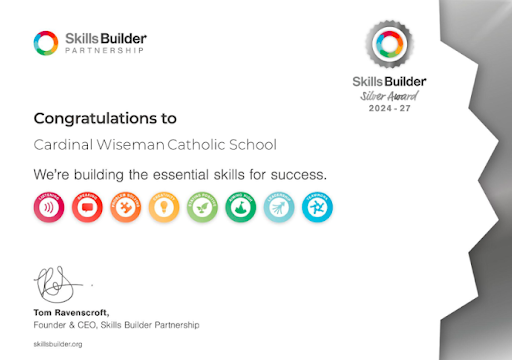

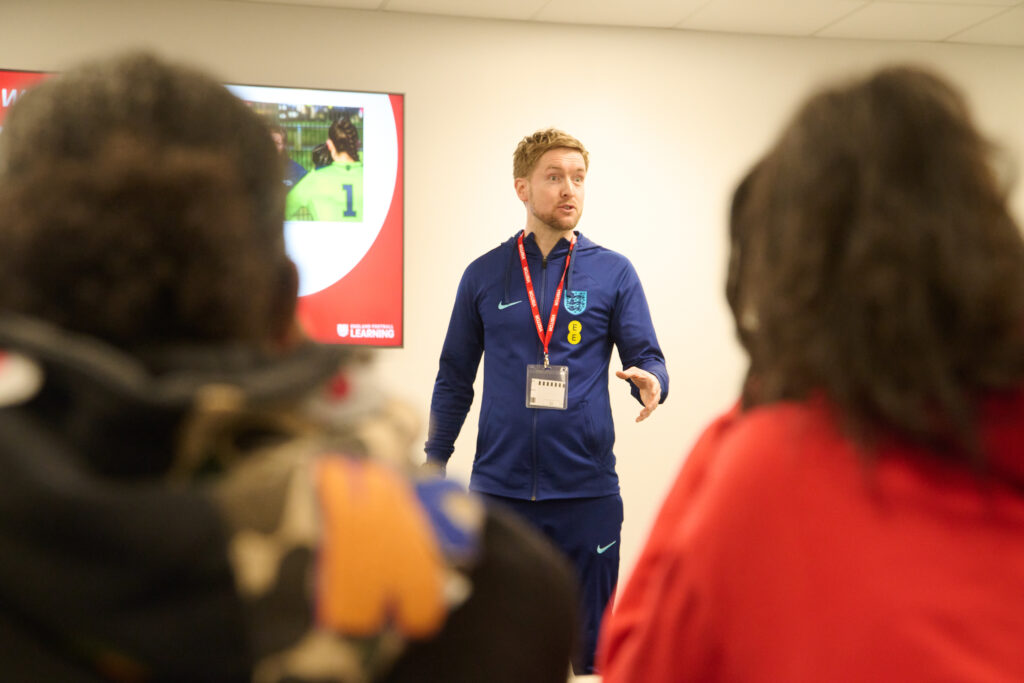

Unifrog: Our one stop shop for everything careers related:
At Cardinal Wiseman every pupil, parent and staff member has a Unifrog login. https://www.unifrog.org/
As well as being able to access a whole range of resources, Unifrog allows the pupils to keep track of all the different events / activities they take part in - both in school and outside of school - which might relate to careers in some way. They can then use this information to help them write their personal statement or CV, or to prepare for interviews as they embark on their post-16 journey. And the best bit is, their Unifrog login can go with them to their next institution when they leave Cardinal Wiseman!

We encourage the pupils to use Unifrog to use Unifrog to:
- Search for opportunities - including apprenticeships and college or sixth form courses;
- Explore pathways using the tools such as the ‘Know how library’ and ‘Careers Library’;
- Complete the quizzes so that they can gain a better understanding of their interests, personality type and skills, and how these can be linked to the world of work;
- Record all the activities, interactions and skills they have taken part in or developed that relate to careers and preparing for future education or employment.
Parent / Carer Engagement:
We actively seek to involve parents/ carers in our careers programme. As mentioned above, every parent has a Unifrog login of their own, so they can get to grips with the platform at their own pace and learn for themselves how they can support their child / children with their next steps. We have a number of parents who get involved in careers events - such as the big careers speed dating extravaganza, and parents are sent a weekly careers newsletter which helps them to keep abreast of the latest careers related news.
The newsletter contains up-to-date Labour Market Information, has a spot-light on a particular University and Employer, and links post-16 options to the different subject areas the pupils will study in school. Link to past copies of the newsletter
I receive regular careers newsletters from the school that advise me on the events that have been arranged. Planning for work experience placements has already started, at the beginning of the academic year, which provides plenty of notice for students to begin considering their options. My daughter received advice and guidance around the options chosen for GCSEs that fit with her aspirations. Parent Feedback.
Focus on careers helps to make learning more relevant and meaningful to students. My daughter wants to learn because she has an idea of the type of career she wants to have, and therefore understands what she needs to achieve to make that possible. Parent Feedback.
Information for Staff:
As a member of staff at Cardinal Wiseman you are an important part of the careers provision. Whether teaching or non-teaching, you will come into contact with pupils and you may be asked careers-based questions or take part in career-based discussions. Access to a variety of careers information can be found within the main body of the career’s website. The Careers Team also works very closely with Heads of Year, pastoral staff and Subject Leaders to provide a variety of information linking curriculum learning to careers and the world of work.
What can I do – ideas:
Familiarise yourself with the Gatsby Benchmarks, particularly Gatsby Benchmark 4;
Embed careers into your scheme of work to help pupils see the links between curriculum learning and careers (Gatsby Benchmark 4);
Highlight jobs that use your subject and the pathways into them;
Embed Skills Builder into your lessons, reinforcing the language of employability skills, such as listening, speaking, problem solving, creativity, staying positive, aiming high, leadership and teamwork;
Have a careers notice / display board related to your subject in each classroom;
Become familiar with future jobs related to your curriculum area and new qualifications and pathways such as T Levels, traineeships, advanced and higher-level apprenticeships;
Encourage pupils to take part in extracurricular activities, the Duke of Edinburgh award, volunteering, work experience etc;
Become familiar with the Careers Plan to see what we offer our pupils;
Meet with the Careers Team to share ideas and ask for support.
We have a good clear careers programme in school so pupils are aware of the routes they can take. Career information is given to pupils throughout the year. Staff Feedback.
Support from local employers / employees:
If you are willing to support us with our careers programme and help us to inspire the next generation, please contact Mrs Buckle on [email protected]
Support can come in many different forms. Examples include:
Attending the careers ‘speed dating’ event.
Assemblies
Smaller workshops / talks
Mentoring
Work experience
For more information on how you can specifically support with work experience please read the information below: Experiences of the Workplace (BM6) Step by step guide for Employers | CEC Resource Directory
